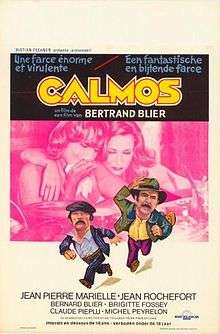Calmos
| Calmos | |
|---|---|
 | |
| Directed by | Bertrand Blier |
| Written by |
Bertrand Blier Philippe Dumarçay |
| Starring |
Jean-Pierre Marielle Jean Rochefort Bernard Blier Brigitte Fossey |
| Music by | Georges Delerue |
| Cinematography | Claude Renoir |
| Edited by | Claudine Merlin |
| Distributed by | AMLF |
Release date |
|
Running time | 107 minutes |
| Country | France |
| Language | French |
Calmos is a 1976 French film directed by Bertrand Blier.
Plot
Two men, fortyish, worn out by their wives, abandon everything to go and live in the back of beyond. There they meet a truculent priest, a boozer, Émile (Bernard Blier) who recalls them to life's simple pleasures. Calm is what they want. But soon their example inspires thousands of disorientated males, fleeing the feminist 1970s. Soon, too, there arrives a squadron of nymphomaniac Amazons.
Cast
- Jean-Pierre Marielle as Paul Dufour, a gynaecologist
- Jean Rochefort as Albert
- Bernard Blier as Émile
- Brigitte Fossey as Suzanne Dufour
- Valérie Mairesse as Claudine
- Micheline Kahn as Geneviève
- Sylvie Joly as The Doctor
- Claude Piéplu as The Old Soldier
- Dora Doll as The Amazon Chief
- Dominique Lavanant as The short-sighted woman
- Marthe Villalonga as An Employee
- Liliane Rovère as A Soldier
Critical response
Pauline Kael reviewed the film in The New Yorker : "Blier's method worked in Going Places, and it works in Get Out Your Handkerchiefs, but something went wrong in his sexual extravaganza Calmos (and the picture failed, even in France)... The two men are joined by other escaping men; women demanding gratification come after them with guns, and it's a full-scale tedious war of the sexes until, finally, the two pals, old men now and shrivelled in size, are dropped out of a cloud onto an island... Calmos is an overscaled back-to-the-womb satiric fantasy - a male daydream about the impossibility of escape from the sexual wars. It's about the demands of sex on men who spent their youth chasing women and now - jaded - want a break from it - they want to go off and live like pigs. It's a funny idea, and though Calmos abandons it, there are still things to look at all through the picture... Throughout the women are made repellently beautiful - they have a neon voraciousness. Brigitte Fossey, a blond cat with a perfect tiny mouth, is like sensual porcelain. No one but Blier has matched such raunchiness and such visual beauty; you have to have a true respect for raunchiness to do that." [1]
References
- ↑ Pauline Kael, reprinted in When the Lights Go Down